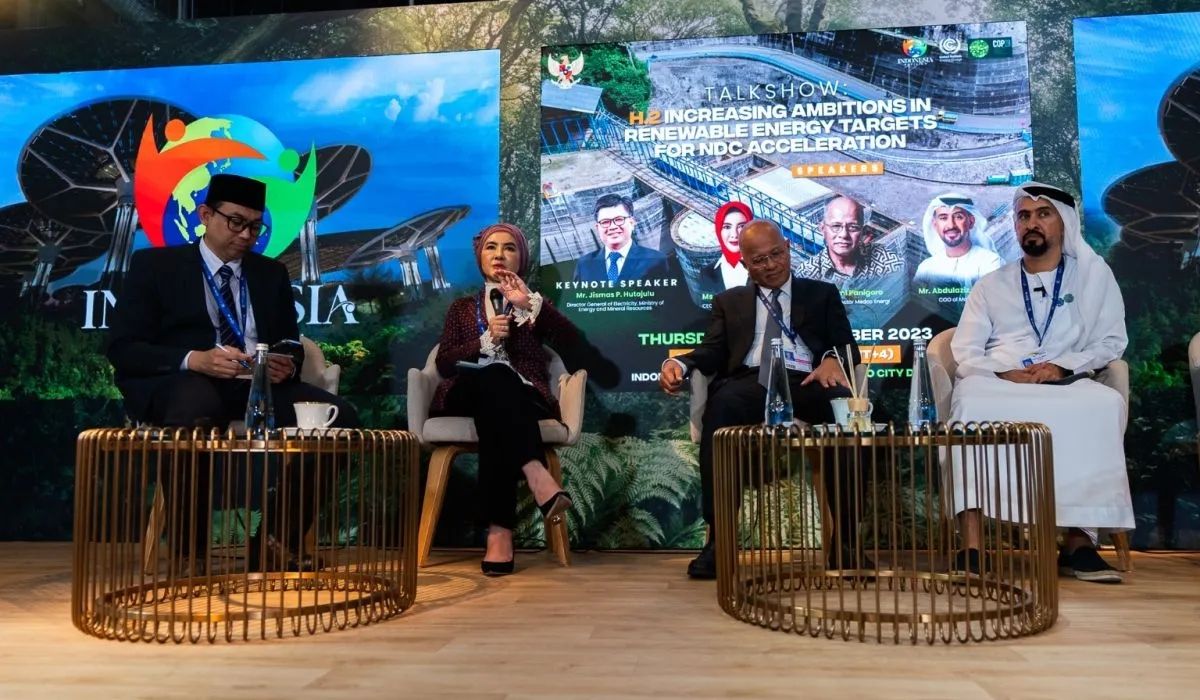JAKARTA, Dec 4, 2023 - (ACN Newswire) - President Director of PT Pertamina (Persero) Nicke Widyawati reiterated Pertamina's commitment to supporting the Indonesian Government in achieving net zero emissions by 2060 at the 2023 UN Climate Change Summit or Conference of the Parties (COP-28), being held in Dubai, the United Arab Emirates, from November 30 to December 12, 2023.

President Director of PT Pertamina (Persero) Nicke Widyawati (second left) during the 2023 UN Climate Change Summit (COP-28), taking place in Dubai, UAE. [Antara / HO-Pertamina]
In a discussion session at the Indonesian Pavilion, Widyawati explained that Indonesia faces an energy trilemma with three main issues: energy security, equality, and sustainability. To deal with these three issues, Pertamina has developed three comprehensive strategic initiatives: decarbonization of the company's operations (scope 1), building new low-carbon businesses (scope 2), and implementing a carbon offset program (scope 3).
As a developing country, she said that Indonesia targets stable economic growth where energy catalyzes economic growth. Therefore, as a state-owned enterprise (BUMN), Pertamina places energy security as a top priority. However, Pertamina must manage the balance for energy equality, which includes energy accessibility, affordability, and energy sustainability in reducing carbon emissions in our operations for scopes one, two, and three, Widyawati said.
She said that Indonesia is not ready to switch all fossil fuels to renewable energy, as this would endanger national energy security. Therefore, Pertamina has developed initiatives for managing sustainability while maintaining energy security and strengthening energy equality.
Pertamina must maintain its primary business, oil and gas, because the Indonesian government aims to increase upstream oil and gas production from 700,000 barrels per day to 1 million barrels per day in 2030. But this is done using a green operation method, she said.
Pertamina is carrying out three initiatives towards energy efficiency, as it is essential and more manageable for reducing emissions. The contribution of energy efficiency to reducing emissions is around 39 percent. That is why we focus on energy efficiency in our operations: upstream, processing, and downstream, Widyawati said.
Next is methane reduction. Methane can destroy the environment, which is worse than CO2 emissions. That is why we have set a target of a 7.6 percent reduction in methane, with carbon emissions (CO2) reduced by 5.5 percent and flare reduction and its utilization by 16.7 percent, she said. From these three operations through the end of last year, Pertamina successfully reduced 31 percent of emissions in its internal operations.
The second initiative is to increase the development of low-carbon products by producing biofuels. Indonesia is the eighth-largest country with forests, so Indonesia can produce biofuel. With the 35 percent biodiesel (B35) program last year, we reduced around 32 million tons of CO2 annually. We will add more B35 now and introduce the 40 percent biodiesel (B40) next year. Even in our new national energy policy, the target is up to 60 percent biodiesel (B60), Widyawati said.
Pertamina has a bio gasoline program that mixes bioethanol from sugar cane, corn, and cassava into gasoline. Pertamina will start with a bioethanol blending level of 5 percent (E5), and in the Indonesian National Energy Policy, it will gradually increase to a bioethanol blending level of 40 percent (E40). Regarding this biofuel, Pertamina has just launched sustainable jet fuel (Sustainable Efficient Fuel), which is mixed with crude palm oil (CPO).
Therefore, this program is the best option for Indonesia. There are three main benefits. First, we can reduce fuel imports through biofuel. Second, we can reduce emissions. And the third is creating jobs in upstream sectors, Widyawati said.
The third initiative is carbon offsetting. Even though fossil fuels and coal-fired power plants still exist, Pertamina must reduce emissions through carbon capture, utilization, storage, and nature-based solutions (NBS). She said the current capacity to absorb emissions from the global environment is up to 15 percent.
Carrying out these various initiatives, she said, Pertamina faces four challenges. The first is the regulatory framework to accelerate the development of renewable energy. The second challenge is related to technology, as Indonesia needs technology for all its abundant natural resources that can be used to produce energy. The next challenge is financial because Indonesia needs funding, especially for the initial stages of research and development. The fourth challenge is building capabilities and capacity. We believe that we need global collaboration to overcome these challenges, especially from governments, Widyawati said.
The Director General of Electricity, Ministry of Energy and Mineral Resources, Jisman P Hutajulu, invited all stakeholders to encourage the energy transition by utilizing New, Renewable Energy. The development of EBT in this energy transition is for the long term, Jisman said on the sideline of a discussion themed "Increasing Ambitions in Renewable Energy Targets for NDC Acceleration" on Thursday (Nov 30).
As a leading company in the energy transition sector, Pertamina is committed to supporting the 2060 Net Zero Emission target by continuing to encourage programs that directly impact the achievement of Sustainable Development Goals (SDGs). These efforts align with implementing Environmental, Social, and Governance (ESG) in all Pertamina business lines and operations.
PERTAMINA, https://www.pertamina.com
Media Contact:Fadjar Djoko SantosoVice President, Corporate Communication, PT Pertamina (Persero)E: fadjar.santoso@pertamina.com
Copyright 2023 JCN Newswire. All rights reserved. www.jcnnewswire.com